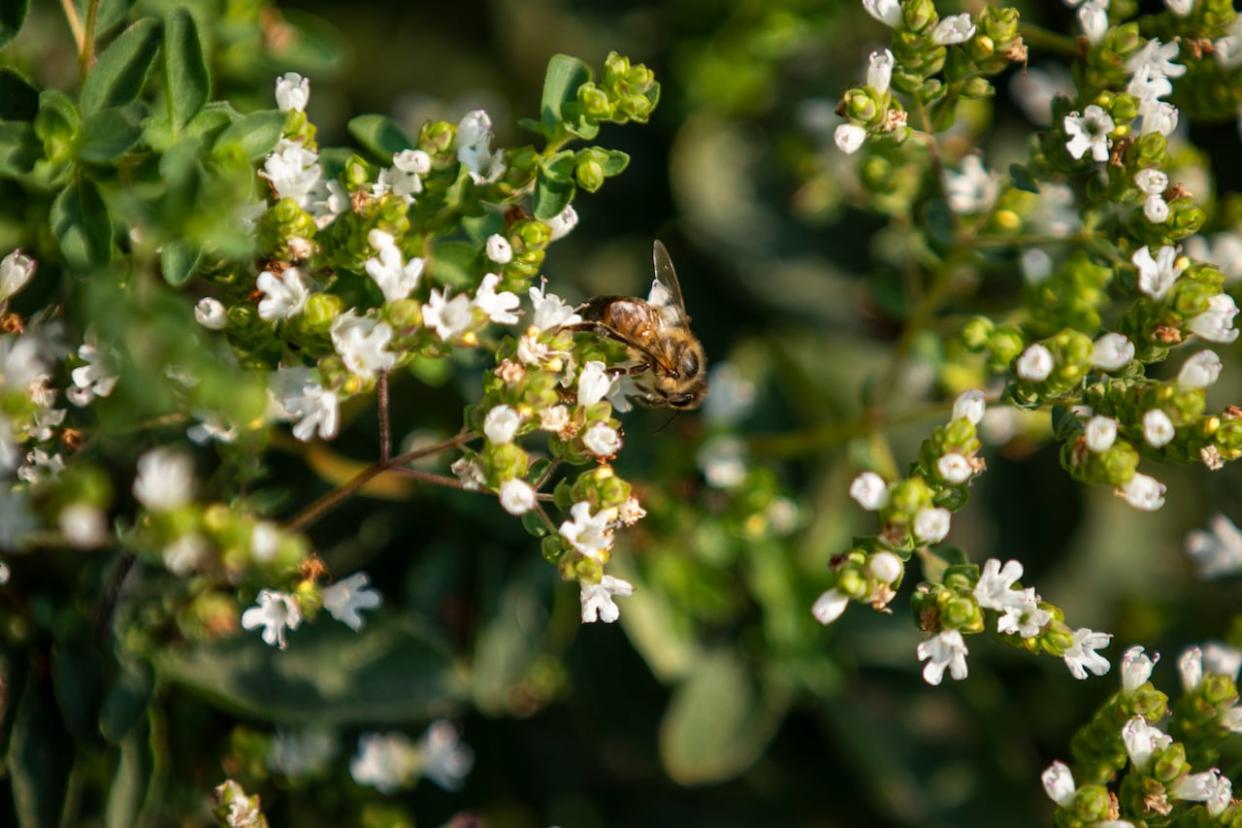'Bee safe' label on pesticides needs to be re-evaluated, University of Guelph researchers say

Researchers at the University of Guelph say they want to see changes to how pesticides are labelled as "bee safe" after their new study found chemicals safe for honeybees may negatively affect wild bees.
The study was published in the Proceedings of the Royal Society B: Biological Sciences ahead of World Bee Day on Monday. It found assessments of a particular insecticide overlooked "some routes of exposure specific to wild bees."
The study authors looked specifically at flupyradifurone, an insecticide that's been determined to be "practically non-toxic to adult honeybees," and its impact on squash bees, which tend to pollinate zucchini, butternut and other squash plants.
Exposure to flupyradifurone can lead to reduced pollen collection by the bees, as well as hyperactivity or changes in reproduction.
Researcher Sabrina Rondeau, who completed the work as part of her PhD at the University of Guelph and is now at the University of Ottawa, said Ontario has about 400 species of wild bees.
"Many of them are very different in their behaviour, for instance, than honey bees," Rondeau said.
"We have about 70 per cent of our wild bee species in Ontario that are ground nesters. So they will make their nest on the ground, which means that they can be exposed to pesticide residues in soil when they make their nests, which the honeybee cannot."
'Fully evaluate the potential risks'
Nigel Raine, who worked on the study with Rondeau and is the Rebanks Family Chair in Pollinator Conservation at the University of Guelph, said their work also highlighted the risks of pesticides when they're combined.
"While some pesticides, like fungicides, may individually pose lower risks to bees, combined exposure with insecticides can result in synergistic effects, amplifying their overall impact," he said in a media release about the study.
"With the phase-out of neonicotinoid insecticides … there is a pressing need to fully evaluate the potential risks posed for all beneficial insects, including pollinators, by alternative pesticides that are replacing them."
Health Canada's Pest Management Regulatory Agency (PMRA) document on flupyradifurone says it was approved for sale and use in Canada because "under the approved conditions of use, the products have value and do not present an unacceptable risk to human health or the environment."
In an email, a Health Canada spokesperson Mark Johnson told CBC News that it was aware of this study, that it will be reviewed and also that the agency "regularly monitors for new information related to pesticides."
"The publication of scientific studies following initial registration is not uncommon. PMRA takes a weight of evidence approach when reviewing new scientific information such as this report," Johnson said.
"We will always take appropriate action if there are reasonable grounds to believe that use of the products is resulting in risks of concern to human health or the environment — including pollinators, such as bees."
He also noted "special reviews can be initiated at any point when there are reasonable grounds to believe that the health or environmental risks of a product, or its value, is unacceptable."
Users should carefully read label: researcher
But Rondeau said that currently, the marketing of some pesticides as being safe for bees is misleading.
"The findings of our study really show the importance of actually re-evaluating how pesticides are assessed for the risk they pose to bees."
Wild bees, she noted, "are very, very important pollinators and very important for agriculture and food production."
She wants to see the federal agencies re-evaluate what can be called bee safe and to warn people who use the pesticides to be aware the products they're using may not be as safe as they believe.
"One very important thing would be to read the label very, very carefully," she said.
"Even if some of these pesticides are labelled as being bee safe, then reading the label will provide a little bit more information, even though it's not as thorough as we would like it to be."


